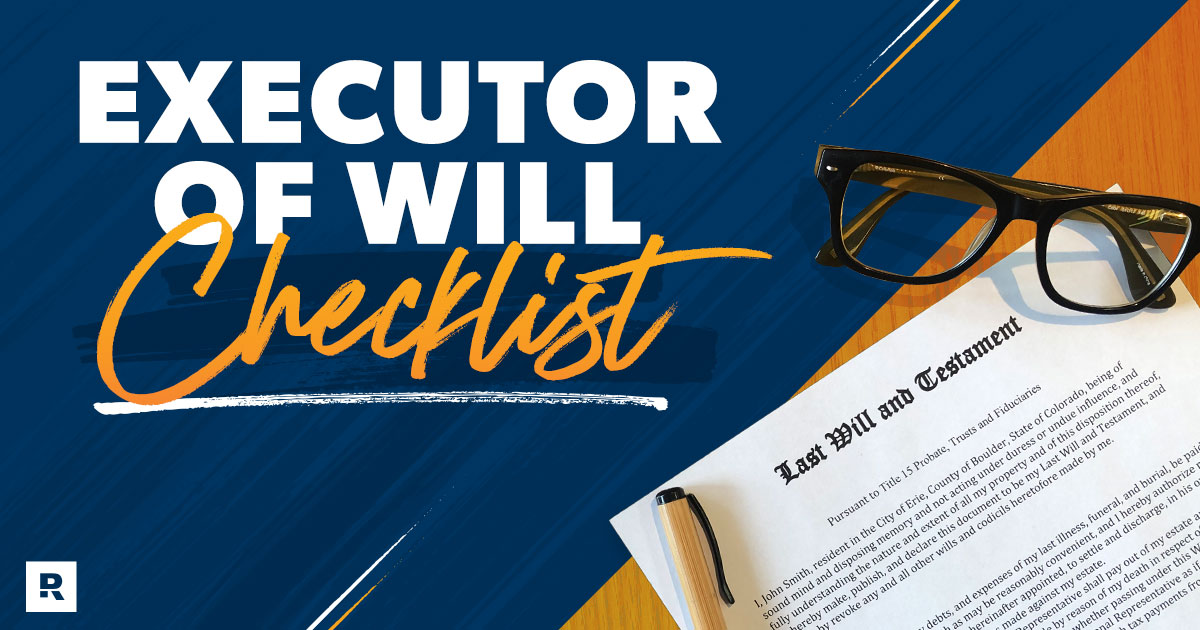
Executor of Will. Now there’s a title with a scary vibe. (Even a little intimidating.) Here’s the thing, though. Whether you’re serving as someone’s executor or just looking for the right person to take that role for your own will, the executor process should be easy. And guess what? It can be! We’re going to show you all the steps on your Executor of Will Checklist and answer all the common questions about finding (or becoming) a great executor.
The Executor of Will Checklist
What all does an executor of will have to do? They have to put somebody else’s last will and testament into force after they’ve died. Can you say huge responsibility? Honestly, it’s a really big job! But never fear! This is totally something that most people can do. And if you have any doubts or questions on how it works, we’re going to address them in a checklist.
(Before we jump into the list, here’s something to keep in mind—the specific duties for an executor vary from state to state. That’s another great reason to work with a wills provider who has knowledge of the laws in your area to be sure everything’s shipshape with your own documents.)
Here are the main things on the executor’s to-do list:
1. Find the will itself.
Assuming there is a will, it’s up to you to go get that thing and refresh your memory on its contents. (Yes, if you’re the executor, hopefully the person you agreed to do this for already shared their wishes with you before death. And you should also know exactly where they stored their final documents.)
2. File that sucker in probate court.
The purpose of probate is to make sure the testator (lawyer talk for a will writer) has their wishes followed, and that it’s all done legally. Sure, the executor does the heavy lifting, but a probate judge is the bigwig who has the power to approve or nix your decisions along the way. The four main goals of a probate process are to see that the executor is acting in the best interests of the estate; to pass property and money to the correct people; to be sure the deceased’s final taxes get paid; and to see that any remaining debts are paid.
3. Get copies of the death certificate.
You’ll need copies of the death certificate to share with several parties. (See the next item.) These can be obtained from your state’s office of vital records.
Don't Know Where to Start With a Will?
Download our will worksheet to get started.
4. Be sure banks, creditors, insurance companies and government agencies know what’s happened.
To begin the process of wrapping up business on behalf of the testator, tell these parties about the death.
5. Show up in court if necessary.
There may be times you’re needed in court to share what’s happening with the execution of the will with the probate judge. When you file the will, be sure to ask the court if and when you’re expected to appear for court proceedings.
6. Tell relevant parties about the open contest period.
No, this isn’t a Hunger Games-style competition for loot. It’s the legally defined window of time when both named heirs and relatives can dispute the will, for a variety of reasons. All heirs in the will, as well as certain blood relatives, are entitled to know from the executor how long the open contest period lasts. This gives them their full legal opportunity to bring any legal challenge they want to the probate process.
7. Guard all the money and property until the process is through.
This is sad to say, but sometimes death attracts vultures. Well-meaning or not, all kinds of people come knocking—and calling and texting—when there’s a death in the family. No matter how energetic or emotional the appeals, the job of protecting the estate’s property from grifters and thieves lies with the executor. And that duty is enforced by law. Failing to secure the deceased’s property can lead to legal repercussions for the executor. If that’s you, do not hesitate to remind all heirs and relatives of the fact.
8. Set up an estate-specific bank account.
This will help to keep you personally in the clear legally and financially as you go about the business of settling the estate.
9. See if there were unpaid taxes.
They say the only sure things in life are death and taxes. And when you’re an executor of will, it’s both! No, Uncle Sam did not forgive those unpaid taxes on death. Now as executor, it’s up to you to check what the departed owed and get the taxes paid from the estate. Don’t forget about the possibility of a federal estate tax event, either. It’s essential you get this step taken care of, not only as part of your duties, but more importantly to protect yourself from a personal obligation to cover the taxes. (Yeah, that’s a thing.)
10. Pay off those debts.
The good news is that the children of the deceased will not be held responsible for their departed parent’s debts. But that doesn’t mean they just expire at the time of death. Once taxes have been covered, any remaining debts have to be covered first before the passing out of assets to heirs.
11. Give the heirs their due!
This part is really fun and will hopefully end up as the main event of the probate. Grief is always hard. But once the legal and financial issues of executing a will are covered, there’s comfort in seeing to it that friends and family are taken care of too.
Save 10% on your will with the RAMSEY10 promo code
Those are the main things on an executor’s plate! If you’re about to jump into that process, you should feel pretty prepared now. But let’s say you’re changing your own will—or writing it from scratch—to reflect your wishes about an executor. There are a few other things you’ll want to be thinking about.
How Should I Choose an Executor of Will?
This needs to be someone you’d trust with your life—or at least with your possessions! Many people choose a family member to do the job. That’s a great choice in most situations. But remember the complexity of some estates may require professional guidance. Consider if you need to name an attorney or financial institution to cover all your estate’s needs.
What Are the Requirements for the Role?
Although these can vary across states, the basics remain the same.
- The person has to be willing to do the job. In other words, just naming them in the will doesn’t mean they’re going to do it some day in the future. If your Cousin Bill seems like the man for the job, be sure to ask if he’s willing.
- The executor is legally required to reside in the same state where the probate is processed, so look for someone in your own area to take this on.
- They’ll have to pass muster with the probate court. Reasons for rejection at the probate stage could include discovery of illicit drug use, felony convictions or questions about the appointee’s ability to be a fiduciary for the estate.
- It should be someone who has the trust of others in your family—not just you. Yes, you may think the world of your Sister Sophia. But what about your other siblings? If there’s been any tension in the family with a particular relative, keep that fact in mind as you name the executor. It could help to head off conflict down the line.
- They have to be a legal adult. This doesn’t necessarily rule out naming a child, even one who’s of minor age today. But to do the job after your death, they’d have to be 18 at the time of the probate process.
- On the other hand, you don’t want to choose a person who’s unlikely to survive you. After you die, it will be too late to notice that the executor you chose has also already departed.
- Look for a detail-oriented person. Executor is not a head-in-the-clouds job. No matter how much you love Saturday-night poker with brother-in-law Sylvester, he shouldn’t be your choice if he forgets to attend business meetings or has trouble paying his bills on time.
What About Choosing My Spouse to Be the Executor?
This is almost always a great choice. After all, you and your spouse should be as united as possible in all your choices around life, money and the future. But the experience of having a spouse die can be overwhelming. It’s possible your spouse won’t be in the right headspace to do an executor’s job. Keep an open mind as you decide on an executor, and if your spouse is prepared to take it on.
What Does the Executor Need to Know From Me?
Hopefully you’ve already confirmed that the person you want for the job is willing to do it. But even if you have, there are some more steps you both need to take to prepare them for what’s potentially ahead. First, share the details of what’s in your will with them. They deserve to know what they’re being expected to take care of and how much of a probate they’re being asked to manage. And whatever you do, don’t forget to tell them where you’re keeping the most up-to-date version of your will.
Is the Executor Allowed to Be a Witness to My Will?
This one’s a bit tricky, but the short answer is, “Usually.” That’s unless you’re leaving the executor a gift in the will. Obviously, an executor is also very often one of the named heirs or beneficiaries, since it’s usually a spouse or child of the deceased. But be aware that in most states, a will must have two witnesses when it’s signed by the testator—and this is key—neither of those witnesses is allowed to be a named beneficiary.
So, if you are not bequeathing anything to the person you wish to make the executor, by all means let them be one of the witnesses. But if you do want to leave that person something, just find someone else to act as a witness. It would be way better to find another witness than to deprive your ideal executor of an inheritance.
What if There Is a Dispute?
The main person handling disputes, at least initially, will be the executor. In other words, beneficiaries or even unnamed relatives usually don’t have recourse to file challenges with a probate court. That’s especially true if the court has already determined that the will is legal and that its named executor qualifies for the job.
An exception could occur, though, if a family member can prove that an executor is guilty of financial or legal impropriety with the estate they’re supposed to be serving. In that case, the probate judge will name a substitute executor, probably a close family member of the deceased who otherwise qualifies legally.
Today’s the Day to Get a Will!
Whether you’re simply shopping for a will and wondering who to appoint as your own executor of estate or taking on that role yourself, you need a will! Learning about an executor’s responsibilities should make that fact pretty obvious.
Did you know you can create your own will online with RamseyTrusted provider Mama Bear Legal Forms in less than 20 minutes? You betcha! They provide attorney-built documents that are state-specific and legally binding. All you need to do is answer a few questions, and the rest of the work is done for you. Once you’ve purchased, there’s no rush. You have 180 days to complete the form from there. Having a will is a key step in financial planning and in loving your family well.
Complete Last Will & Testament Package for One Person
Includes:
- Last Will & Testament
- Health Power of Attorney
- Finance Power of Attorney
Complete Last Will & Testament Package for Married Couples
Includes:
- Two Last Will & Testaments
- Two Health Powers of Attorney
- Two Finance Powers of Attorney
Interested in learning more about estate planning?
Sign up to receive helpful guidance and tools.




